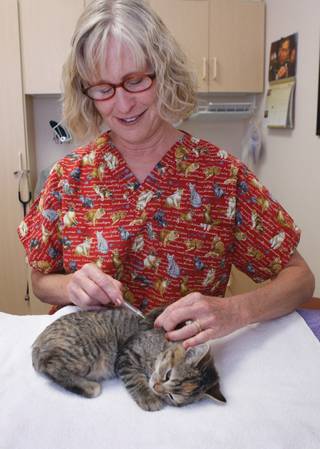Wednesday, Nov. 18, 2009 | 3:18 p.m.
Reader poll
Sun Archives
- Pet sterilization. Not mandatory, yet (10-21-09)
The Las Vegas City Council, heeding the call of a wide coalition of spay-and-neuter proponents, on Wednesday passed the toughest such ordinance in the region in an attempt to reduce rampant pet overpopulation.
After a hearing that lasted almost three hours, the council voted 5-2 to pass the measure.
Council members Lois Tarkanian and Ricki Barlow voted against it, echoing opponents' main concern: that the ordinance requires all dogs and cats older than four months be spayed or neutered, except under certain circumstances.
Tarkanian -- who said she polled 10 veterinarians -- as well as a few citizens who spoke on the issue, each said they believed that while spaying and neutering pets is usually humane at six months, four months is often too young. One opponent termed it “mutilation.”
Councilman Barlow wondered if a compromise age could be reached.
But proponents were in no mood for conciliation. Councilman Steve Ross, who sponsored the ordinance, said the time for such revisions was past -- as was the option of doing nothing in the hope that the problem simply goes away.
“Sitting on our hands is not an option,” Ross said.
Those in favor of the measure clearly outnumbered opponents in the boisterous crowd, which cheered when the ordinance passed. Proponents ranged from area animal control officials, veterinarians and animal behaviorists to community activists and even a ninth-grade girl who is a foster owner of eight puppies.
The city’s detention and enforcement chief, Karen Coyne, said in fiscal 2009 the city impounded 19,682 animals -- more than 12,000 of which, or 62 percent, were euthanized. Those numbers have steadily risen both for cats and dogs over the last three years, she said.
Regionwide last year, 55,000 stray animals found their way to shelters. More than 30,000 were put to death.
Coyne said there was no realistic alternative to the spay-and-neuter ordinance, which was modeled after the measure North Las Vegas passed about one year ago. Clark County has yet to pass such a measure, but officials there say it will be revisited.
The ordinance will exempt those with permits as dog or cat fanciers, breeders or professional animal handlers.
City officials also noted that regular pet owners who don't want their pet spayed or neutered could obtain a non-professional breeder permit at a small annual fee. Certain restrictions would apply in those cases, including a visit from an city animal control staffer to make sure the household is suitable for pet ownership and breeding.
In addition to the spay-and-neuter provisions, the ordinance also requires that cats and dogs have tiny microchips implanted before being adopted or recovered from an impound. No one at the council meeting took issue with that provision.
Shelters are mostly exempted from the ordinance. But the Lied Animal Shelter, which serves Las Vegas, North Las Vegas and Clark County, already has a policy in place mandating that pets adopted from the shelter are microchipped, vaccinated and spayed or neutered.
The ordinance is in part aimed at so-called backyard breeders, who have been illegally breeding pets to turn a quick buck -- and severely adding to the overpopulation problems.
One veterinarian scoffed at the notion that the ordinance was unnecessary because the only thing that needed to be done was find more people to adopt unwanted pets.
“We cannot adopt our way out of this problem,” said Amy Mitchell, a veterinarian at Lied. “To think we can adopt our way out is living in Never Never Land.”
Mitchell termed the pet overpopulation issue as a “reproductive nightmare.”
Opponents of the measure expressed a few concerns other than their main problem about the young age of those that now need to be sterilized.
In some cities that have adopted these types of measures, owners who don’t want to abide the laws have become reluctant to take their animals to the vet, because their scared to be reported to the authorities, they said.
That’s led to an increase in rabies and other preventable illnesses, the opponents claimed.
Just before the vote took place, Ross added a provision to mandate that the council review the ordinance annually to make sure it’s working as expected.


Join the Discussion:
Check this out for a full explanation of our conversion to the LiveFyre commenting system and instructions on how to sign up for an account.
Full comments policy